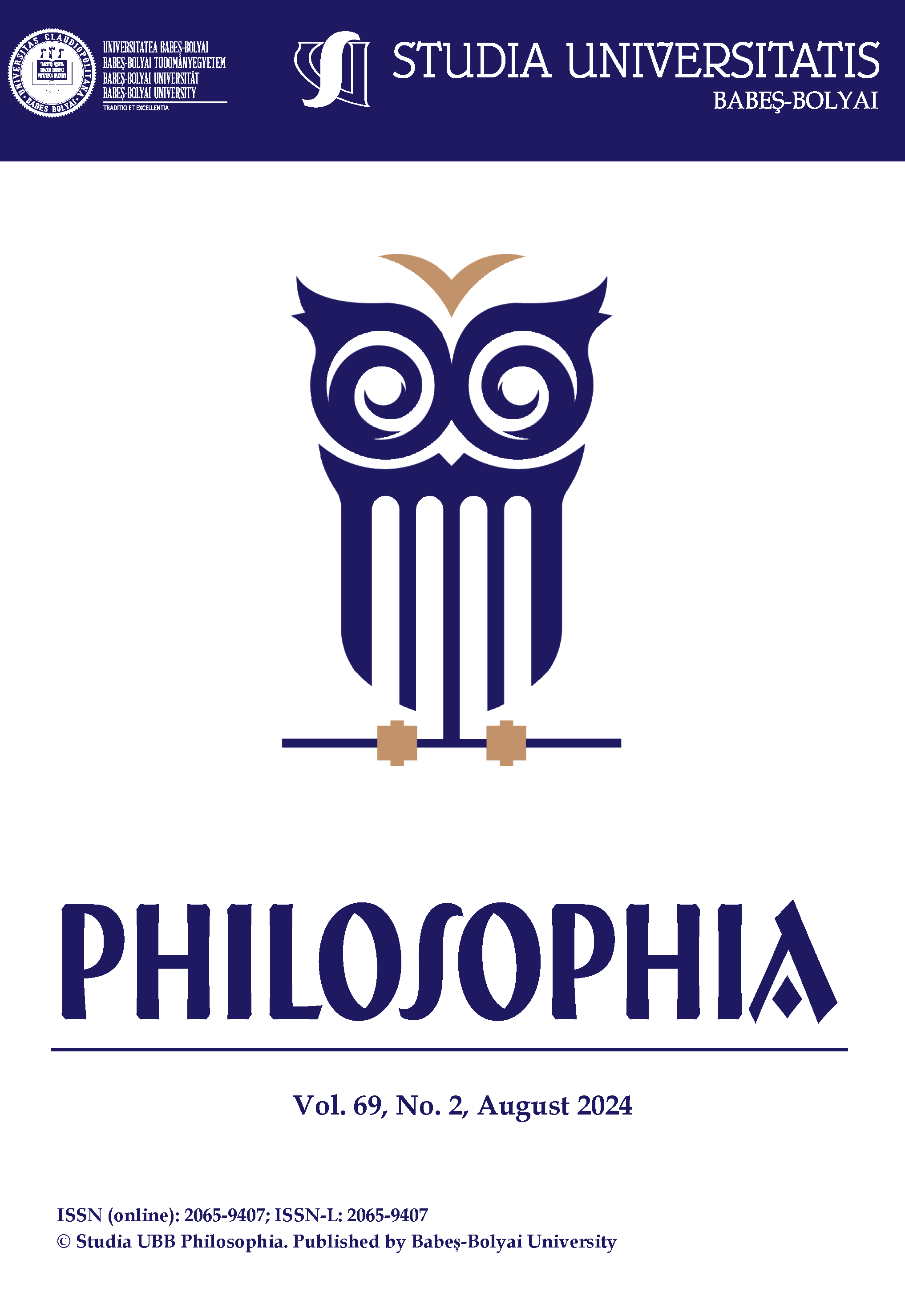Aristotelian Roots of Contemporary Tense Logic
DOI:
https://doi.org/10.24193/subbphil.2024.2.04Keywords:
Tense Logic, Sea-Battle Paradox, Future Contingents, Arthur Prior, AristotleAbstract
Tense logic is a branch of contemporary logic which includes formal devices that allow us to deal with the temporal relations between propositions. The aim of our paper is threefold: 1) to reveal how Aristotelian philosophical ideas about time, truth, possibility and necessity were reinterpreted by the founder of contemporay tense logic Arthur Prior; 2) to discuss what novel solutions to the classical problem of future contingents are available using Priorean invention; 3) to describe how the tools of tense logic have transcended their original theoretical purposes.References
Aristotle. The Complete Works of Aristotle, Volumes I and II., ed. Barnes, J., Princeton: Princeton University Press, 1984.
Belnap N. & Green M., ”Indeterminism and the Thin Red Line”, in Philosophical Perspectives 8, 1994, pp. 365–88.
Bigelow J., ”Presentism and Properties”, in Philosophical Perspectives, No. 10, 1996, pp. 35–52.
Birkhoff G. & von Neumann J., ”The Logic of Quantum Mechanics”, in Annals of Mathematics (Second Series), No. 37 (4), 1936, pp. 823–843.
Blank D. L. & Kretzmann N., Ammonius: On Aristotle On Interpretation 9 with Boethius: On Aristotle On Interpretation 9, London: Bloomsbury Academic, 1998.
Borghini A. & Torrengo G., The Metaphysics of the Thin Red Line, in Correia, F. and Iacona, A. (eds.), Around the Tree, Synthese Library Vol. 361, 2013, pp. 105–127.
Bourne C., A Future For Presentism, Oxford: Oxford University Press, 2006.
Carnap R., Meaning and Necessity: A Study in Semantics and Modal Logic, Chicago: Chicago University Press, 1947.
Dean, T. L., & McDermott, D. V., ”Temporal Database Management”, in Artificial Intelligence No. 32 (1), 1987, pp. 1–55.
Dyke H., ”McTaggart and the Truth About Time”, in ed. Craig Callender, Time, Reality and Experience, Cambridge: Cambridge University Press, 2002, pp. 135–151.
Fisher, M., Gabbay, D., & Vila, L. (Eds.), Handbook of Temporal Reasoning in Artificial Intelligence. Elsevier, 2005.
Forrest P., ”The Real but Dead Past: a Reply to Braddon-Mitchell”, Analysis, No. 64 (284), 2004, pp. 358-362.
Gale R., ”McTaggart's Analysis of Time”, in American Philosophical Quarterly, No. 3 (2), 1966, pp. 145–152.
Gaskin, R., The Sea Battle and the Master Argument: Aristotle and Diodorus Cronus on the Metaphysics of the Future, Berlin – New York: De Gruyter, 1995.
Goranko V., Temporal Logics, Cambridge University Press, 2023.
Greenough P., ”Indeterminate truth”, in Midwest Studies in Philosophy, 32, 2008, pp. 213–41.
Kripke S. A., “A Completeness Theorem in Modal Logic“, in Journal of Symbolic Logic, No, 24 (1), 1959, pp. 1–14.
Kripke, S. A., “Semantical Considerations on Modal Logic“. Acta Philosophica Fennica No. 16, 1963, 83–94.
Łukasiewicz J., Selected works, L. Borkowski (Ed.), London, UK: North Holland Publishing Company, 1970 [1920].
MacFarlane J., “Future Contingents and Relative Truth“, in The Philosophical Quarterly, Vol. 53, No. 212, 2003, pp. 321–36.
Malpass A. and Wawer J., “A Future for the Thin Red Line“, in Synthese, no. 188/1, 2012, pp. 117–142.
Markosian N., “A Defence of Presentism“, in Oxford Studies in Metaphysics, No. 1 (3), 2004, pp. 47-82.
Markosian N., “Time“, in ed. J. W. Carroll & N. Markosian, An Introduction to Metaphysics, New York: Cambridge University Press, 2010, pp. 159-184.
McDermott, D., “A Temporal Logic for Reasoning about Processes and Plans“, in Cognitive Science, No. 6(2), 1982, pp. 101–155.
Mellor D. H., Real Time, Cambridge: Cambridge University Press, 1981.
Mellor D. H., Real Time II. London: Routledge, 1998.
Øhrstrøm, P., “Anselm, Ockham and Leibniz on Divine Foreknowledge and Human Freedom“, in Erkenntnis, No. 21, 1984, pp. 209–222.
Øhrstrøm, P. & Hasle, P., “Future Contingents“, in The Stanford Encyclopedia of Philosophy (Summer 2020 Edition), Edward N. Zalta (ed.), URL = <https://plato.stanford.edu/archives/sum2020/entries/future-contingents/>.
Øhrstrøm, P. & Hasle, P., “A. N. Prior‘s Rediscovery of Tense Logic“, Erkenntnis, No. 39, 1993, pp. 23–50.
Parsons, T., Articulating Medieval Logic, Oxford University Press, 2014.
Pnueli, A., The Temporal Logic of Programs, in Proceedings of the Eighteenth IEEE Symposium on the Foundations of Computer Science, IEEE Computer Society, 1977, pp. 46–57.
Prior, A. N., “Three-Valued Logic and Future Contingents“, Philosophical Quarterly, vol. 3, 1953, pp. 317–326.
Prior, A. N., Time and Modality, Clarendon Press, 1957.
Prior, A. N., Past, Present and Future, Oxford University Press, 1967.
Russell B., The Collected Papers of Bertrand Russell, vol. 5: Toward Principia Mathematica, Ed. G. H. Moore, London & New York: Routledge, 2015.
Smart J. J. C., “The Tenseless Theory of Time“, in eds. Theodore Sider, John Hawthorne & Dean W. Zimmerman, Contemporary Debates in Metaphysics, MA: Wiley-Blackwell, 2008, pp. 226–238.
Thomason R. H., “Indeterminist time and truth value gaps”, in Theoria, 36, 1970, 264–281.
Thomason, R., “Combinations of Tense and Modality“, in eds. D. Gabbay & F. Guenthner, Handbook of Philosophical Logic, volume II: Extensions of Classical Logic, Reidel, 1984, pp. 135–166.
Tooley M., Time, Tense and Causation, Oxford: Clarendon Press, 1997.
Williamson, T., “How did we get here from there? The transformation of analytic philosophy“, Belgrade Philosophical Annual No. 27, 2014, pp. 7–37.
Downloads
Published
How to Cite
Issue
Section
License
Copyright (c) 2024 Studia Universitatis Babeș-Bolyai Philosophia

This work is licensed under a Creative Commons Attribution-NonCommercial-NoDerivatives 4.0 International License.





